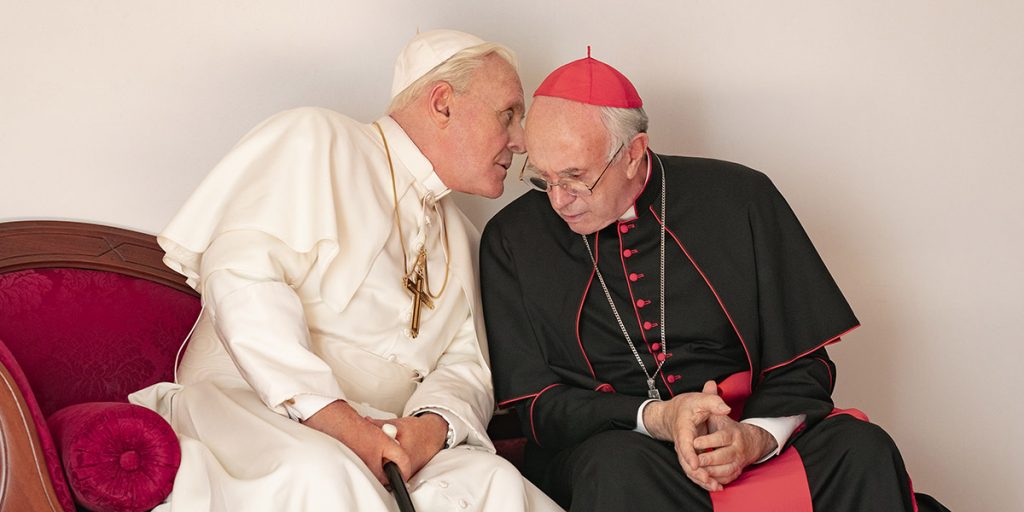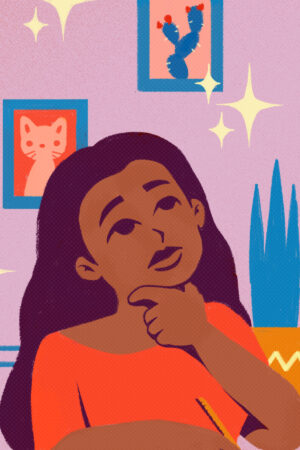It was the meeting of two titans of the Catholic faith, but aside from a few souls, the world would otherwise never know that these figures once peaceably exchanged ideas about religion and leadership. Based on true events that inspired Anthony McCarten’s play The Pope, Fernando Meirelles’ cinematic adaptation The Two Popes is a surprisingly witty and illuminating look at the theologies of the two most recent popes. Perhaps it’s not the most thrilling of movie options to watch the then sitting Pope Benedict XVI (Anthony Hopkins) jabber on through gorgeous secret gardens and sacred grounds with the yet-to-be Pope Francis (Jonathan Pryce), then known as Cardinal Jorge Mario Bergoglio, but the tension between their convictions and a church at war with itself is all you need to get the movie’s story rolling.
The two men could not be ideologically more opposed to one another. Pope Benedict championed scholarship and conservatism over Cardinal Bergoglio’s message of compassion and progressive leadership. Even before Pope Benedict’s appointment (when he was just Cardinal Joseph Ratzinger), the two cardinals were opponents in the Vatican chambers. Their personalities clashed from top-to-bottom, with Pope Benedict enjoying the political jockeying of wooing more cardinals’ votes and the ceremonious pomp and circumstance of fancy Pope-wear. Cardinal Bergoglio instead preferred a more quiet, humble life outside the Vatican politicking, opted to stick to his plain black shoes over the Pope’s traditional red slippers and turned down much of the pageantry that came with the Pope process.
Meirelles, the Brazilian director behind City of God, keeps his subjects’ conversation at a brisk pace. It rarely lags and is surprisingly filled with motion as the two men of God walk around the Vatican, the Sistine Chapel and the Pope’s summer residence (or at least recreations of them). When the two are seated, the camera is not. It moves around freely between the two creating the illusion of motion as if our heads were following a tennis ball make its way from one side of the court to the other. Although Meirelles captures the two at a time of emotional crisis, the world around them is bright and sunny. In flashback sequences to Bergoglio’s youth (played here by Juan Minujín), the scenes are in black and white, dimmed down to seem more like an aged photo than a crisp modern-day filter. Meirelles also includes a number of newscasts to tie the behind-the-scenes conversations the public’s not privy to with what we do remember of what happened.
Although Pryce is not Argentine like the character he plays, his Spanish is dubbed so that the accent is right, and he’s the spitting image of the future pontiff. His performance as the cardinal-turned-pope is that of an upbeat man who enjoys watching his country play in the World Cup, an extroverted spirit among the people. Pryce holds onto a wry smile for much of his conversation with Hopkins, who in keeping with their characters’ opposing dynamics, holds a frown. The purpose of Hopkins’ performance is not to make Pope Benedict a villain but an equal player to intellectually tango with the movie’s main character. Although cold and introverted, there’s an empathetic side to him as well, one that loves classical music and tells the occasional joke about the German sense of humor.
So as not to wholly deify the current Pope, the movie explores Bergoglio’s guilt over not having done the right thing at the height of political upheaval in Argentina. This is the only point in which the film’s momentum slows down, and eventually, there is a resolution to the tangent. It’s worth noting that although Bergoglio shares his crisis of faith, Ratzinger’s youthful regrets — if he had any — are not explored. For him, it’s the present-day crisis of church scandals that cause him to reconcile whether or not he wants to hold the papacy any longer.
For a movie about intellectual conversations, Meirelles keeps the tone light. There’s nothing a solid pardon can’t help alleviate. With its bouncy dialogue and sharp look at the politics behind the papal hat, Meirelles’ The Two Popes feels like a kinder version of an Armando Iannucci movie (In the Loop, The Death of Stalin). I’m curious to know if The Two Popes will inspire any sort of conversation among religious viewers, Catholics or otherwise. At the film’s premiere screening at the Toronto International Film Festival, a row of priests sat in the balcony, wearing their collars and respectfully subdued black jackets. I didn’t disturb their night out at the movies, but with regular news updates about the church once again dissatisfied with its progressive leader, there’s any number of ways you can side with or against what the movie’s trying to say about the future of religion, connecting with a congregation and learning to listen to one another.
The Two Popes screened at the Toronto International Film Festival. In select theaters on November 27 and on Netflix December 20.







